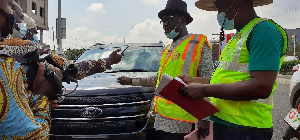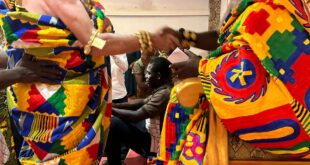The exercise, done in collaboration with the Motor Transport and Traffic Department (MTTD) of the Ghana Police Service, was also to sensitize the public to comply with the necessary road regulations.
Some drivers were arrested for various offenses such as driving with a foreign license, having tainted glasses, using expired DV number plates, driving without number plates, vehicles with excess seats as well as invisible insurance and roadworthy stickers.
Mr. Joseph Clifford Obosu, Deputy Director of the Driver Training Testing and Licensing (DTTL) Unit of the DVLA, said number plates should be embossed and issued by the Authority and not plastic ones, which are sometimes fake.
He said some vehicles were without reflectors, making them difficult for one to make out the number at night, adding that it is a threat to security and must not be encouraged.
Mr. Obosu also cautioned manufacturers of inferior number plates to desist from such practices before the law catches up with them.
On the use of DV number plates, Mr. Obosu said they are ideally meant for garages, workshops and that an individual could apply for it when traveling outside the country.
According to Mr. Obosu, such plates should not be used as the normal ones throughout the year, stating that they should not be used for any other purposes apart from the above mentioned.
He advised against unregistered vehicles carrying an unapproved number of persons, adding that the number should be at most two – the owner and buyer (tester).
Mr. Obosu asked commercial drivers to stick to the number of persons approved by DVLA, stressing that there should be a 70 centimeters interval from the seats to make passengers comfortable and prevent them from being entrapped in case of accidents.
He said certificates of garage owners would be revoked should they alter DVLA’s number of persons on tickets given them.
On the issue of driver licensing, Mr. Obosu said that it has a six-year life span, which should be renewed (validated) every two years and replaced when it expired.
 Home Of Ghana News Ghana News, Entertainment And More
Home Of Ghana News Ghana News, Entertainment And More





